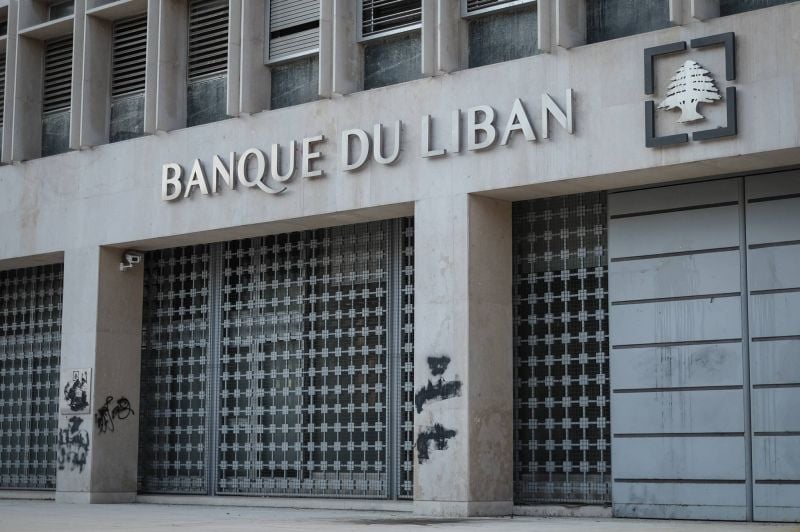
The Banque du Liban headquarters in Beirut. (João Sousa/L'Orient Today/File photo)
As its acting governor Wassim Manssouri has repeatedly stated, Banque du Liban’s central council believes that Lebanon — which has been in crisis for four years and has almost always accumulated the same three structural deficits in its budget, trade and balance of payments — must float the lira.
There is now a general consensus on this position, including from the International Monetary Fund (IMF).
Once the country’s authorities agree to floating the currency, a measure that the IMF has included in its list prerequisite to unlock billions of aid dollars, the next challenge for Lebanon will be to make this transition a success.
This measure would be twofold: first, getting rid of the last shreds of the old exchange rate regime based on the fixed parity of LL 1,507.5 to the dollar, which was all but shattered at the end of 2019, giving way to a system where several rates coexist.
Second, rolling out an exchange rate platform operated from abroad that guarantees a certain level of transparency and, in theory, allows banks that have been abandoned by depositors to gradually reposition themselves at the heart of the economy, thereby limiting the cash economy that has continued to develop.
The project, supported by the IMF, had been championed for months by BDL’s four vice governors before Manssouri took over on an interim basis, replacing Riad Salameh who had been in office since 1993 and left at the end of his term on July 31.
To implement this project, the central council has decided to turn to the US firm, Bloomberg LP, one of the two heavyweights of the world markets with the Anglo-American company Refinitiv, a former branch of Reuters. The decision was taken in recent weeks and the cabinet gave BDL the green light at its meeting on Sept. 7. The name of the new platform that will replace Sayrafa is still unknown.
Rollout schedule
This choice was partly motivated by economic reasons. “Using Bloomberg LP will not cost the Lebanese cabinet or BDL anything. In fact, almost all banks have this service provider, which offers essential tools in their field of activity,” said a source at BDL.
A glance at the selling points of Bloomberg LP and Refinitiv on their websites suggests that Bloomberg LP may have won out because it does not charge commission on transactions; Bloomberg LP’s media department did not respond to a request to verify this feature.
Now that it has obtained the backing of the cabinet, BDL is finalizing the contract that will be signed with Bloomberg LP. “The agreement could be sealed in a week. Then it will take between one and three weeks to roll out the network and issue the circulars that will lay the foundations for regulating the new system,” said the BDL source.
Simple operation?
According to the BDL source, operating this new platform will be more complex than a simple website or exchange rate application.
More specifically, it is an aggregator, an IT infrastructure set up by a supplier specializing in the processing and sharing of financial data. “In the 1980s and 1990s, these types of platforms simply displayed prices. Today, they have become the norm,” a bank executive, who requested anonymity for professional reasons, told L’Orient-Le Jour.
The operation of such a platform is fairly simple and is based on the principle of supply and demand (if supply is greater than demand, the price falls, and vice versa).
For example, an entrepreneur looking to exchange their Lebanese lira for a certain sum in dollars will log on to the platform via their bank or authorized money exchanger, indicating the exchange rate they are ready to accept. For the request to be taken seriously, the rate offered must be close to the market rate, which for the time being is defined by formal and informal exchange agents as long as the new platform is not established and the economy is dominated by cash.
Stabilizing the market
Clearly, launching the platform alone will not stabilize the exchange rate or resolve all the structural failings that have destabilized it and are helping to prolong this destabilization.
However, according to the BDL source, it will make it possible to redirect some of the companies that used to deal with large volumes to the banks and will limit a little more the room for maneuver by speculators and informal agents. It will also send a positive signal to international bodies, such as the Financial Action Task Force, which, like the IMF and the World Bank, are concerned to see Lebanon with a failing banking sector and an increasingly informal, cash-based economy.
Summer is drawing to a close; BDL’s room for maneuver is shrinking more with each day of delay in implementing reforms.